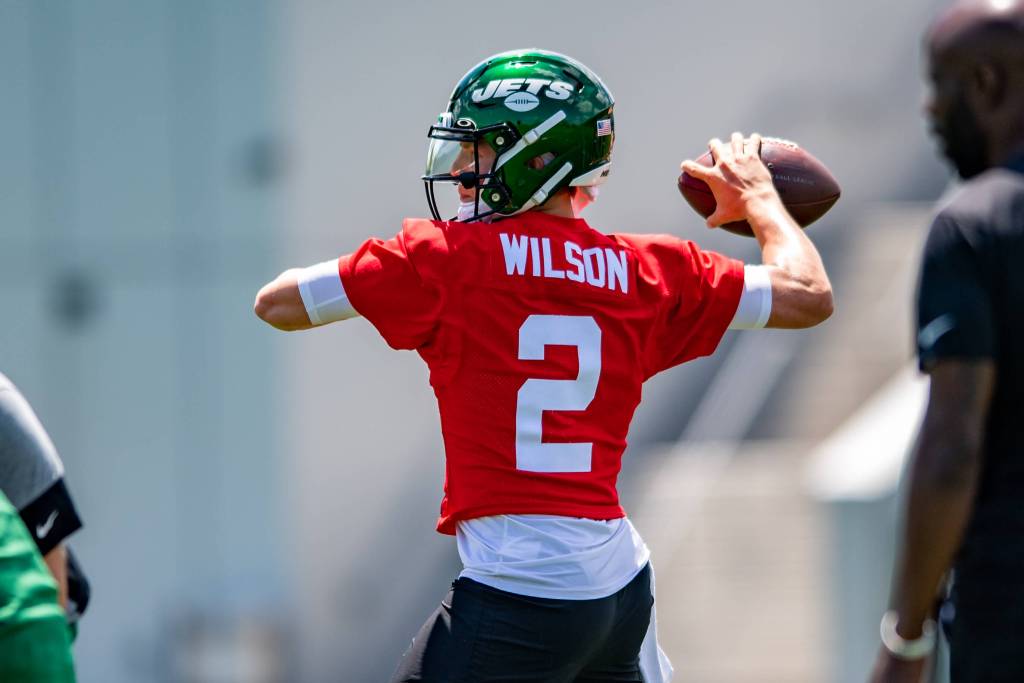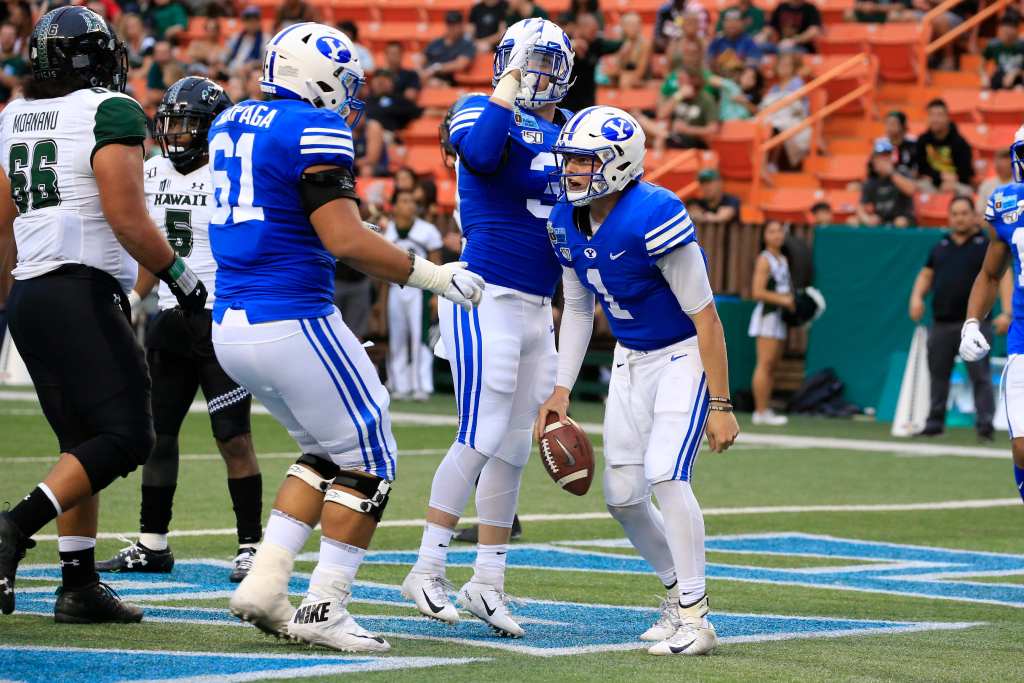
ESM looks back on a fateful offseason for the New York Jets, starting with the big changes at quarterback.
Following the conclusion of minicamp activities, the NFL offseason is officially over. The next time the New York Jets convene in Florham Park, they’ll be getting ready for preseason and regular season action for the 2021 campaign.Â
With the offseason in the rearview mirror, ESM looks back on the green offseason that was, position-by-position. We start off at the quarterback spot…

Jan 3, 2021; Foxborough, Massachusetts, USA; New York Jets quarterback Sam Darnold (14) throws on the run against the New England Patriots during the first half at Gillette Stadium. Mandatory Credit: Winslow Townson-USA TODAY Sports
How It Started
The Jets’ offseason centered around a puzzling conundrum: the NFL future of Sam Darnold. Conventional stats (as well as the fact they held the second overall pick in the draft) more or less implored the Jets to move on: Darnold ranked 40th in competition rate (59.8) and 41st in passer rating (78.5) amongst 42 quarterbacks (min. 500 attempts). Yet, there was a tantalizing case to prolong his New York career, a major temptation to answer a question Jets fans have asked and continued to ask…what would Darnold look like in a system that wasn’t overseen by Adam Gase?
For all the offensive malarkey the Jets had gone through in the Gase era, Darnold has still provided momentary flashes of brilliance that eeked through the endless layers of green gridiron gloom. Some felt that Darnold had the necessary skills to survive in the NFL, he just needed the proper support staff. There was only so much Darnold could’ve done while working in a Gase system and his top options being first-round washouts (Breshad Perriman) and current lacrosse stars pulled out of New England’s antique pile (Chris Hogan). In March, the Jets added Corey Davis and Keelan Cole, a pair of consistently reliable talents looking to make a bigger impact. Had Darnold been kept aroud for the eventual drafting of Elijah Moore, it would’ve been the most talented receiver class Darnold ever had to work with.
Darnold’s support problems were not limited to his receiving arsenal. The crucial developmental stages of his NFL career were staged in the midst of constant rumors surrounding Le’Veon Bell, who was a discount version in everything but his price tag ($52.5 million). That big contract and several other factors (i.e. general negligence) delayed any plans to bolster the offensive line. Darnold, after all, went through three different primary centers over his first three NFL seasons. To their credit, the Jets seemed to finally be seeing the light in the late stages of Darnold’s tenure, passing on elite receiving talent to draft Louisville blocker Mekhi Becton and later trade up with Minnesota for Alijah Vera-Tucker.
As for the backup quarterback spot, the Jets had the right idea when it came to Joe Flacco. The cheap deal signed late in the offseason (one-year, $1.5 million) and Flacco’s own words made it clear that he wasn’t meant to be any long-term backup solution. It was a contract that gave Darnold a year under Flacco’s watch while the one-time Super Bowl MVP (who truly sought a new area to take over the QB1 role) had a chance to prove to new suitors that he could still be a serviceable NFL option after enduring a neck injury during his previous stop in Denver.

How It’s Going
Ultimately, the Jets sent Darnold south, trading him to the Carolina Panthers in exchange for three draft picks, one of which was a second-round choice to be used next season. Even before Darnold was shipped off to Charlotte, the Jets spent the offseason in the thick of the quarterback discussion. Not only were they present at all major rookie quarterback showcases, but they were said to be in the thick of the Deshaun Watson sweepstakes before assault allegations ended that conversation.
Those factors all but assured that the Jets were going to use their premier pick on a non-Trevor Lawrence quarterback, eventually revealed to be Zach Wilson when the league converged on Cleveland in April. With the selection of Wilson out of BYU, general manager Joe Douglas has officially etched his signature onto his New York mosaic. He now has his own head coach (Robert Saleh) and quarterback running the show after working with the used parts of the Mike Maccagnan era’s final days.
As expected, Flacco moved during the offseason, joining a curious passing situation in Philadelphia that has been implied to give him a chance to compete for the starter’s spot. Despite several serviceable backup candidates emerging (i.e. Brian Hoyer, Nick Mullens), the Jets curiously opted to stick with their current backup situation of James Morgan and Mike White.

Dec 24, 2019; Honolulu, Hawaii, USA; Brigham Young Cougars quarterback Zach Wilson (1) celebrates with teammates after running in a touchdown against the Hawaii Warriors in the second half of the Hawaii Bowl at Aloha Stadium. Mandatory Credit: Marco Garcia-USA TODAY Sports
Are They Better Off?
One could have, and probably still can, make the case for Darnold staying in New York. The temptation to see him with a new support staff could’ve allowed the Jets to either use the second overall pick on one of their many other areas of need or even trade it to further reinforce those positions.
Ultimately, though, trading the Darnold was the best move for all parties. There’s no use in comparing Darnold and Wilson right now, especially when the latter has yet to throw an NFL pass (Lord knows the post-Week 1 discourse following the Jets and Panthers’ meeting in Charlotte will be arduous enough). But wondering whether Darnold’s issue was simply a coaching thing was a question the Jets couldn’t afford to answer anymore, especially when holding a draft choice that allowed them the pick of the non-Lawrence litter in Cleveland.
For Darnold, this move works on a personal level as well. He can now try to reclaim the narrative on his NFL career in relative obscurity in Carolina, a stark contrast to the constant tabloid attention in New York and the meme makers that pounce on the slightest green controversy on the internet (let’s face it, if the “I’m seeing ghosts” thing happened anywhere else, it’d be forgotten in a week). Time will tell if Wilson is the long-sought answer under center after decades of false prophets, but the Jets at least deserve some props for knowing when to cut ties and go back to the drawing board.
The Jets’ backup situation remains rather curious, however. As it stands, the Jets’ trio of quarterbacks has zero NFL regular season passes between them. New York is obviously pinning its future hopes and dreams on Wilson’s development. Holding minicamp with Wilson as the primary man more or less guarantees that the Jets aren’t practicing the “Kansas City model” a la Alex Smith/Patrick Mahomes.
But that shouldn’t mean that Wilson immediately must become the most experienced quarterback in the room. Even if one claims that adding a veteran to mentor the rookie (Chicago’s Nick Foles, perhaps?) is a passing cliche at this point, the Jets should at least bring on some insurance in case of an emergency. The team was 0-10 in the three-year Darnold era when backup quarterbacks had to step in. There’s no evidence that White or Morgan (who didn’t even dress for a game in his rookie year) are capable of breaking that trend if the unthinkable happened to Wilson. The playoffs remain a tall ask, but that doesn’t mean the Jets should punt on 2021 contests.
The Jets were right to kick off a new era of football, efficiently hitting the fast-forward button in their franchise timeline. But that doesn’t mean he should have to do this alone, especially in his own position room.
Final Offseason Grade: C+
Did the Jets make the right move in drafting Wilson? Or should they have stuck with Sam? Continue the conversation on Twitter @GeoffJMagsÂ